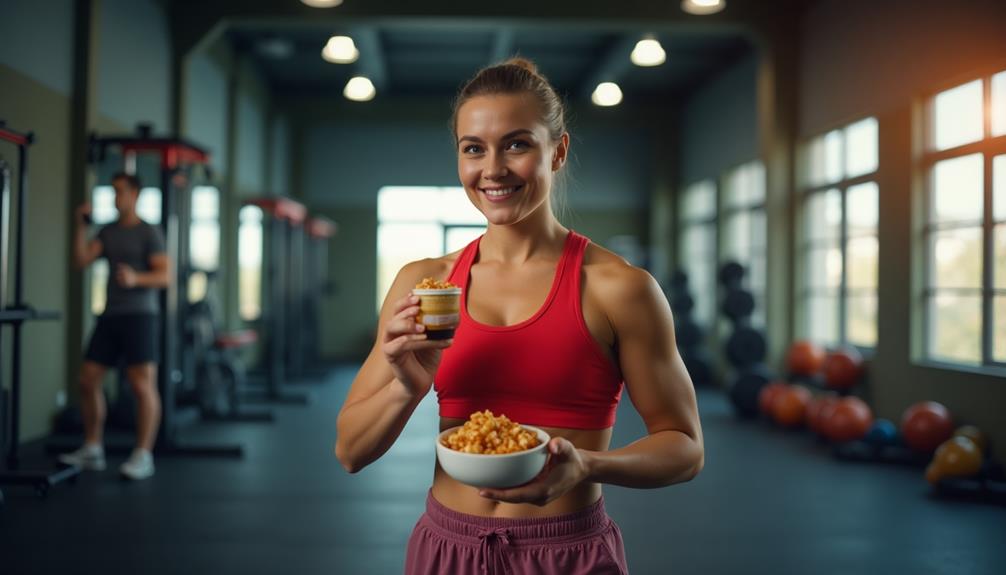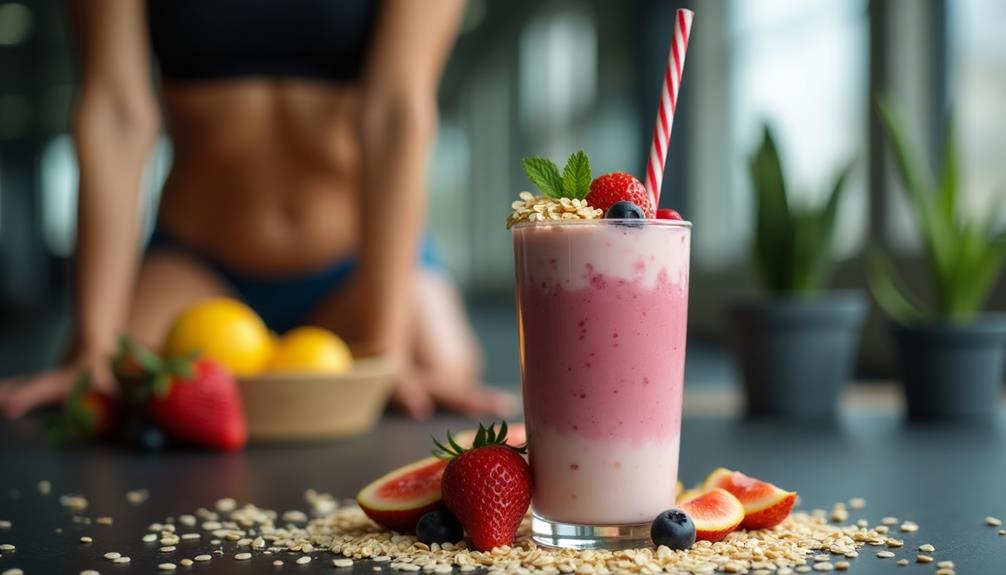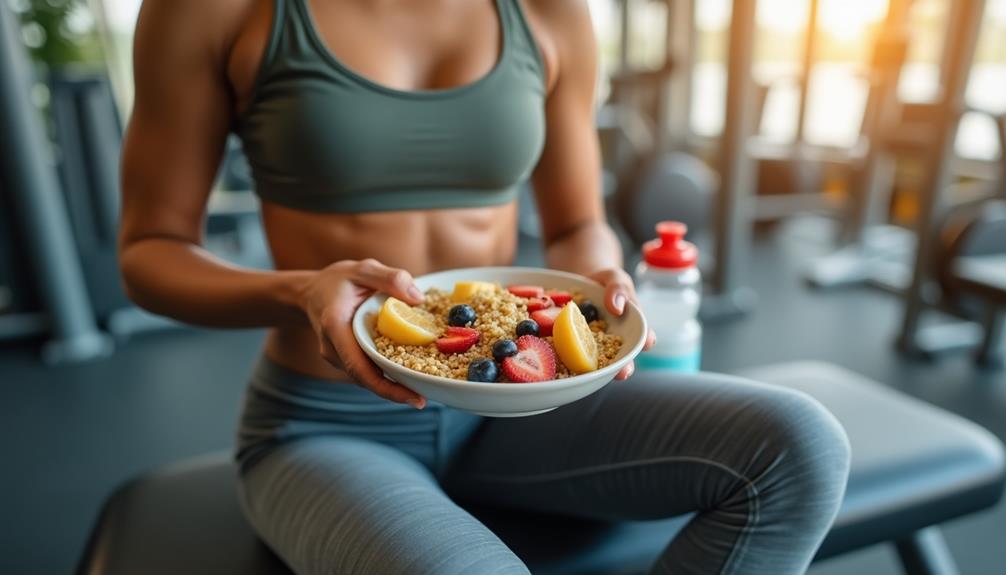Post-workout carbohydrate replenishment is essential to your recovery and performance. First, it helps restore glycogen stores depleted during exercise, preventing fatigue and promoting sustained energy. Quick-digesting carbs stimulate insulin production, which aids in muscle repair and reduces breakdown. Foods like bananas and oatmeal are excellent choices for faster recovery. Additionally, replenishing carbs boosts your energy levels, preparing you for your next workout. For best results, combine carbs with protein to maximize muscle recovery. Understanding the correct timing and types of carbohydrates can enhance your performance even further, so there's a great deal more to learn about the most effective strategies.
Core Insights
- Post-workout carbohydrate replenishment restores glycogen stores, providing essential energy for future workouts and activities.
- Consuming carbs after exercise stimulates insulin levels, aiding in protein synthesis and reducing muscle breakdown.
- Quick intake of carbohydrates enhances recovery time, allowing athletes to train harder and more frequently.
- Carbohydrate sources like bananas and oatmeal boost energy levels, promoting sustained focus during workouts.
- Proper carb replenishment lowers cortisol levels, minimizing stress-related muscle breakdown and supporting overall muscle repair.
Importance of Glycogen Stores

Glycogen stores play a pivotal role in your athletic performance and recovery. When you engage in physical activity, your body uses glycogen as a primary energy source. This stored form of carbohydrate fuels your muscles, allowing you to maintain intensity and endurance during workouts. After exercise, these stores must be replenished to prepare your body for future activities. Fast-acting carbohydrates are particularly effective for rapid glycogen replenishment, supporting prime recovery. Insufficient glycogen can lead to fatigue, decreased performance, and slower recovery times. By consuming carbohydrates post-workout, you help restore glycogen levels, enabling your muscles to recover effectively. This process not only enhances your energy for subsequent workouts but also supports overall athletic performance. Prioritizing glycogen replenishment is essential for anyone looking to maximize their training efforts and achieve their fitness goals.
Enhancing Muscle Recovery

- Stimulates Protein Synthesis: Carbs help increase insulin levels, which aids in transporting amino acids to muscles for repair. High-carb powders can be an effective way to quickly replenish glycogen stores and kickstart the recovery process.
- Reduces Muscle Breakdown: A proper carb intake minimizes catabolism, protecting your hard-earned muscle mass.
- Enhances Recovery Time: Quick carb consumption can speed up recovery, allowing you to train harder sooner.
- Improves Overall Performance: By supporting muscle recovery, you're setting yourself up for better performance in future workouts.
Make post-workout carbs a priority for effective recovery!
Boosting Energy Levels

| Carbohydrate Source | Glycemic Index | Recommended Serving Size |
|---|---|---|
| Bananas | 51 | 1 medium |
| Oatmeal | 55 | 1 cup cooked |
| Sweet Potatoes | 54 | 1 medium |
| Whole Grain Bread | 71 | 2 slices |
Improving Athletic Performance

Improving athletic performance hinges on the right post-workout nutrition, particularly carbohydrate replenishment. When you refuel effectively, you enhance your body's ability to recover and prepare for the next workout. Carbohydrate powders offer a convenient and efficient way to replenish glycogen stores post-exercise. These specialized supplements can be easily mixed with water for quick absorption. Here's how carbohydrate replenishment can boost your performance:
- Restores Glycogen: Quickly replenishing glycogen stores allows for sustained energy during subsequent workouts.
- Enhances Recovery: Proper carbs reduce recovery time, helping you get back to training sooner.
- Improves Endurance: Carbs provide the energy needed for longer, more intense sessions.
- Supports Focus: Stable energy levels help maintain concentration and mental clarity during workouts.
Preventing Muscle Breakdown

Here's a quick overview of the benefits:
| Benefit | Description |
|---|---|
| Glycogen Restoration | Replenishes energy stores for recovery |
| Insulin Response | Promotes muscle repair and growth |
| Reduced Cortisol Levels | Lowers stress hormone linked to breakdown |
| Enhanced Recovery | Speeds up recovery time post-workout |
| Improved Performance | Prepares you for future workouts |
Optimal Timing for Carbs

- Immediately Post-Workout: Your muscles are primed to absorb nutrients right after exercise.
- Within 30 Minutes: This is the critical window for replenishing glycogen stores effectively.
- 1-2 Hours After: Continuing to consume carbs during this period supports sustained recovery.
- Throughout the Day: Spread your carb intake to maintain energy levels and support muscle repair.
Types of Carbohydrates to Consume

When you're selecting carbohydrates to consume post-workout, it's crucial to focus on those that can swiftly replenish glycogen stores. Rapid-digesting carbs, like white rice, bread, or pasta, can assist you in refueling effectively. You might also consider fruits, such as bananas or berries, since they offer natural sugars that your body absorbs quickly.
Sports drinks and energy gels are other convenient options, as they're specifically formulated for speedy glycogen replenishment. On the other hand, while whole grains and fiber-rich carbs are nutritious, they digest more slowly and may not be optimal immediately after exercise. Prioritize quick-acting carbohydrates to guarantee you maximize recovery and energy levels for your next workout.
Balancing Carbs With Protein

Balancing carbs with protein after a workout is essential for best recovery and muscle repair. This combination helps replenish glycogen stores and supports muscle synthesis. To achieve the right balance, consider these key points:
- Ratio Matters: Aim for a 3:1 ratio of carbs to protein to optimize recovery.
- Quick Sources: Choose fast-digesting carbs like fruits or rice cakes alongside protein sources like yogurt or protein shakes.
- Timing is Key: Consume your post-workout meal or snack within 30 minutes for maximum effectiveness.
- Hydration: Don't forget to hydrate, as water plays an important role in nutrient absorption.
Practical Tips for Replenishment

After a tough workout, you want to refuel effectively to kickstart your recovery. Here are some practical tips for carbohydrate replenishment:
- Timing Matters: Aim to consume carbs within 30 minutes post-exercise for ideal recovery.
- Choose the Right Sources: Opt for easily digestible carbs like fruits, sports drinks, or rice cakes.
- Pair with Protein: Combine carbs with protein to enhance muscle repair.
- Hydrate: Don't forget to drink water or electrolyte-rich beverages.
- Listen to Your Body: Adjust your intake based on workout intensity and duration.
| Carbohydrate Source | Protein Pairing |
|---|---|
| Banana | Greek yogurt |
| Rice cakes | Nut butter |
| Oatmeal | Protein shake |
| Sweet potato | Cottage cheese |
| Whole grain toast | Eggs |
Frequently Asked Questions
Can Too Many Carbs Post-Workout Be Harmful?
Yes, consuming too many carbs post-workout can lead to weight gain and insulin spikes. It's important to balance your intake based on your activity level, so you fuel your body without overloading it.
How Do Individual Carb Needs Vary by Sport?
You might think all athletes need the same carbs, but that's far from true. Your sport's intensity, duration, and personal energy expenditure shape your unique needs, ensuring you fuel your body just right for peak performance.
Are There Specific Carbs to Avoid After Workouts?
After workouts, you should avoid high-sugar and processed carbs, as they can spike your insulin levels and may lead to energy crashes. Focus on whole food options that support recovery and sustained energy instead.
What Role Do Hydration and Electrolytes Play in Recovery?
Oh sure, just skip hydration and electrolytes; who needs them? In reality, they're essential for recovery, helping you rehydrate, maintain balance, and ward off cramps. So, drink up and replenish those electrolytes like your life depends on it!
Can I Rely Solely on Supplements for Carbohydrate Replenishment?
You can't solely depend on supplements for carbohydrate replenishment. Whole foods provide essential nutrients and fiber that supplements lack. Balancing both options guarantees you meet your energy needs and supports overall recovery effectively.

